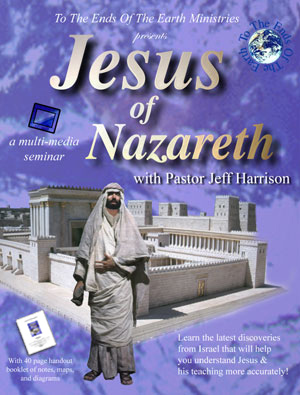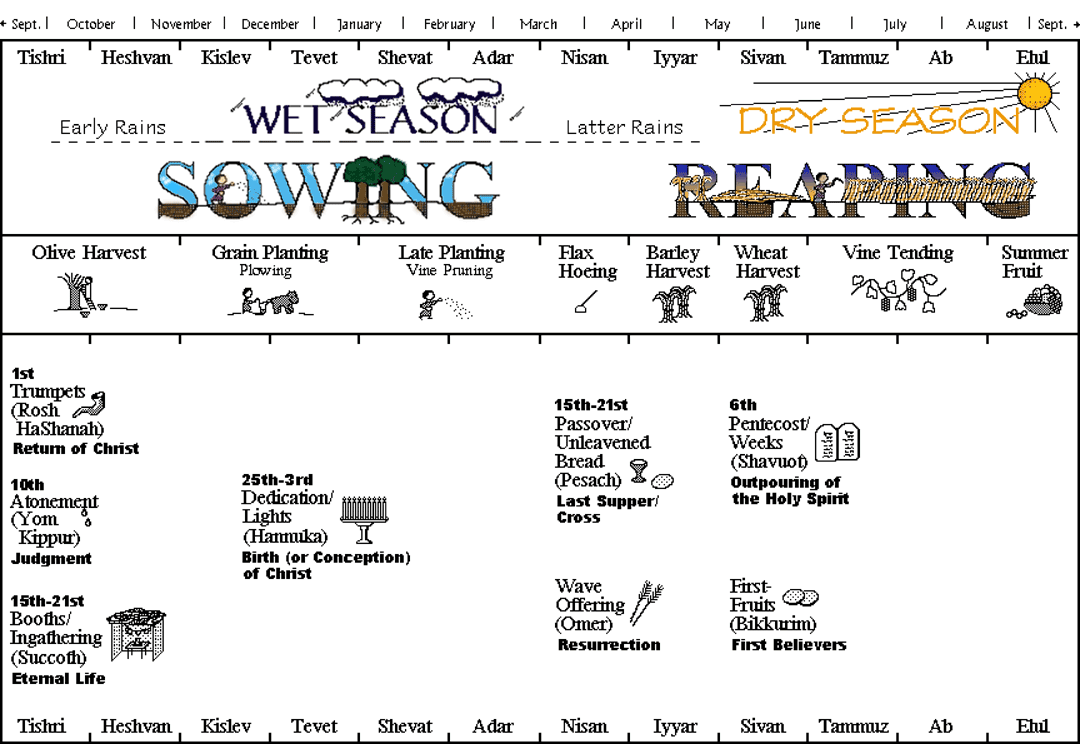Jesus of Nazareth
—A Landmarks of Faith Seminar—

Lecture #1b Audio
Jewish Life as Jesus Experienced It
 See notes below.
See notes below.Lecture #1b:
Or click here for more listening options at Internet Archive.
__________________________
Lecture #1b Notes
SABBATH
The Biblical Sabbath is from Friday night sunset to Saturday night sunset, when the first three medium-sized stars are visible (Exo. 20:8-11, Deut. 5:12-15).
Genesis 1:5: There was evening and there was morning, one day.
The Rabbis listed thirty-nine kinds of work that were forbidden on the Sabbath: The main classes of work are forty minus one: sowing, plowing, reaping, binding sheaves, threshing, winnowing, cleansing crops, grinding, sifting, kneading, baking, shearing wool, washing or beating or dyeing it, spinning, weaving, making two (or more) loops, weaving two (or more) threads, separating two (or more) threads, tying (a knot), loosening (a knot), sewing two (or more) stitches, tearing in order to sew two (or more) stitches, hunting a gazelle, slaughtering or flaying or salting it or curing its skin, scraping it or cutting it up, writing two (or more) letters, erasing in order to write two (or more) letters, building, pulling down, putting out a fire, lighting a fire, striking with a hammer, and taking anything out from one domain into another (from a private area to a public area or from a public area to a private area)
(Shabbat 7:2).
Sabbath Day’s Journey: Limited to 2,000 cubits (just over half a mile, a little less than 1 km; Acts 1:12).
Shabbat Elevator: An elevator that automatically stops at every floor on the Sabbath (Exo. 35:3).
Breaking the Sabbath: is permitted to save a life.
Sabbath Barriers: Police-type barriers typically set out in front of a synagogue in Israel on the Sabbath to prevent vehicles driving in front of it.
Sabbath Candles: Typically pairs of candles lit just before the beginning of the Sabbath and that continue to burn through the early evening hours of the Sabbath.
Discovery: Hundreds of oil lamps from the time of Jesus have been found in excavations in Israel.
Matt. 25:8: And the foolish [virgins] said to the wise [virgins],
Give us some of your oil, for our lamps are going out.
CALENDAR
The Jewish calendar is lunar, so it shifts every year compared to our solar calendar. About every three years, an extra month of Adar (VeAdar) is added to harmonize with the solar calendar.

Dew: A natural miracle: There is enough dew to ripen the summer fruit during the dry part of the year.
Hanukkah: The Feast of the Dedication of the Temple, also known as the Feast of Lights. It celebrates the victory of the Jewish Maccabees over the armies of the Greeks. Some believe Jesus was born during this festival.
John 10:22-23: Now the Feast of Dedication [Hanukkah] took place in Jerusalem; it was the rainy season [winter], and Jesus was walking about in the Temple...
Hanukkiah: The nine-branched candlestick used in the celebration of Hanukkah.
Passover (Pesach): The Passover Seder Meal is held on the first evening of the week-long Festival of Unleavened Bread (Lev. 23:5-8). This is the original setting for Jesus’ teaching that we celebrate as the Lord’s Supper or Communion Service. In Jesus’ day, as today, the whole week of the festival is referred to as Passover.
(1 Cor. 5:7-8: For Messiah our Passover Lamb also has been sacrificed. Let us therefore celebrate the feast, not with old leaven...but with the unleavened bread of sincerity and truth
)
Wave Offering (the Omer): An offering of the first fruits of the barley harvest (Lev. 23:9-14). This offering points prophetically to Jesus’ resurrection.
1 Cor. 15:20: But now Messiah has been raised from the dead, a first fruit of those who are asleep [in death].
Counting the Omer: The fifty days between the Wave Offering (Omer) and Pentecost (Lev. 23:15-16). In the year of Jesus’ crucifixion, he appeared to his disciples after his resurrection during the first forty days of this period.
Pentecost (Weeks, Shavuot): The fiftieth day (Lev. 23:16-21; Exo. 23:16). In Jesus’ day, as today, Pentecost was considered a celebration of the giving of the Law on Mt. Sinai. This was the festival at which the Holy Spirit was poured out on Jesus’ disciples, who were gathered for the holiday in Jerusalem.
(Jer. 31:31,33: Behold, days are coming...when I will make a new covenant with the house of Israel.... I will put my Law within them, and on their heart I will write it; and I will be their God...
)
(Isa. 59:21: This is my covenant with them:...my Spirit which is upon you, and my words which I have put in your mouth...
)
Acts 2:1: When the day of Pentecost had come...
Bikkurim: The first fruits of the wheat harvest. In the year that Jesus rose from the dead, 3,000 souls were gathered on this day (Acts 2:41).
Feast of Trumpets (Rosh Hashanah): The most important new moon celebration of the year. A time for the blowing of the shofar (the ram’s horn trumpet, Lev. 23:23-25).
New Moon (Rosh Chodesh): (Num. 10:10; 28:11-15). Celebrated every month. This was when the first tiny sliver of the moon was seen visually and reported to the Temple. The sighting of the new moon was announced with signal fires and later with messengers sent out to the various Jewish communities.
Matt. 24:30: And then the sign of the Son of Man will appear in the sky...
1 Cor. 15:51-52: We will all be changed, in a moment...at the last trumpet; for the trumpet will sound, and the dead will be raised incorruptible.
Day of Atonement (Yom Kippur): A full twenty-four hour day of fasting (Lev. 23:26-32). On this day they performed the ritual of the scapegoat (Lev. 16:7-10). It’s considered a day of repentance. It points forward to God’s coming judgment of the earth.
Acts 27:9: ...since the Fast [of the Day of Atonement] was already over...
Tabernacles (Booths, Succoth or Sukkot): The end of the fruit harvest, the final harvest of the year (Lev. 23:34-44). Families build a tabernacle (or booth), in memory of life in the desert in the time of Moses. A picture of the temporary nature of this life, and reminder of the life to come.
(John 1:14: The Word became flesh, and tabernacled among us...
)
(John 7:2,37-39: But the feast of the Jews, the Feast of Tabernacles, was near.... On the last day, the great day of the feast, Jesus stood and cried out, saying,
)If anyone is thirsty, let him come to me and drink.... Out of his belly will flow rivers of living water
.... This he spoke about the Spirit...
(Zech. 14:16: Any who are left of all the Gentiles...will go up from year to year...to celebrate the Feast of Tabernacles
)